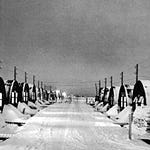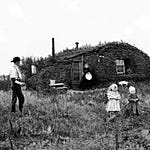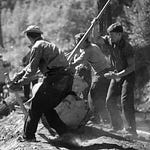It is July 16, 1858.


Abraham Lincoln is in Bloomington, Illinois, sitting in an audience which has gathered to hear Senator Stephen A. Douglas speak.
Douglas, a Democrat, is running for reelection and Lincoln has emerged as his main challenger.


The long-simmering issue of slavery has been shoved to the front burner with the Supreme Court’s recent decision in the Dred Scott case.
‘Black people are not citizens,’ the Court had said, ‘and the federal government has no power to prohibit slavery in US territories.’


In Bloomington, Douglas, a Constitutional originalist and states’ rights advocate, defended the Court’s decision:
“I do not believe that the signers of the Declaration of Independence had any reference to Negroes when they used the expression that all men were created equal... They were speaking only of the white race, and never dreamed that their language would be construed to include the negro.”

And Douglas criticized Lincoln’s recent ‘house divided’ speech, in which Lincoln had said a nation ‘half slave and half free’ could not permanently endure.
Lincoln’s speech was an incitement for sectional warfare, he said.
‘Mr. Lincoln stirs up ill-feelings and hot blood between brethren of the same Republic…and goes for the Northern States to make war upon the Southern States to make them conform to such rules as the North shall dictate to them.’

Douglas ended his speech with a request for votes as an expression of ‘the soundness of my principles and the correctness of my course.’
And the audience then turned in their chairs to look at Lincoln, who sat there among them.
Loud cheers went up for him to speak, with some reports claiming these cheers were louder than those given to Douglas.
So, Lincoln rose from his chair and went to the front of the hall and stood at the podium.
‘The time will come for me to address the concerns expressed by Mr. Douglas,’ he told the audience, ‘But this meeting tonight was called by Mr. Douglas’s friends.’
Then he left the hall to the sound of more loud cheers.

In six days, Lincoln will write to Douglas, proposing they engage in a series of formal debates.
It was ‘game on.’















Share this post